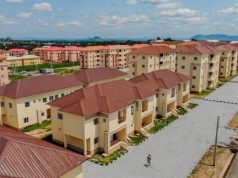Abuja – December 31, 2023 – From our Stand (100)
In contrast to expert predictions that year 2023 would witness steady expansion in the real estate sector, the Housing sector this year hasn’t been particularly great. This is due to numerous factors, which aggravated the already-existing housing deficits in the country, factors like inflation, the elimination of fuel subsidies, and insecurity, building collapse, wide spread demolitions , impeded the housing sector this year.
Our stand this week is a reflection of the year 2023, which many have described as one of the hardest for the real estate sector.
Nigeria with a homeownership rate of just 25% of its population of over 200 million, saw the development of the real estate sector greatly hampered by rising interest rates, sharply declining family income, rapidly rising foreign currency rates, its General elections, which led to the transition to a new government and inadequate fiscal measures this year.
The decision to remove fuel subsidies had a significant impact on the real estate industry, raising building and operating expenses, and directly affecting Nigerians’ purchasing power.
A surge in fuel prices caused transportation expenses for workers and building supplies to sky-rocket, which had a major effect on project budgeting and delivering schedules. High energy expenses for property management were also been brought on by the increase in fuel prices, which had an impact on both residential and commercial real estate operations.
Inflation and high building materials cost, also topped the sector’s woes in the outgoing year, among the traditional risk factors, were high and unfriendly interest rate environment, and poor land acquisition policy.
Figures released by the National Bureau of Statistics (NBS) in its third quarter 2022 GDP report showed construction and real estate sectors growth trajectory in 2022. The report showed that both sectors together contributed N20 trillion to the GDP in the first three quarters of 2022.
It was anticipated that the industry would expand in the upcoming year due to rising economic activity and the resulting demand for real estate assets.
However, the majority of the projections were shattered as the economy began to deteriorate quite early in the “new” year. The sector’s performance in the first quarter of the year showed this. In comparison to 4.92 percent in the first quarter of 2022 and 5.62 percent in the fourth quarter of 2022, real estate services contributed 4.46 percent to the nominal GDP in the first quarter of 2023.
Rent and the cost of purchasing new homes increased by over 100% in certain areas, while the prices of building supplies such as cement, sand, reinforcing, paints, and construction supplies increased by more than 50%. Because building costs had risen to an estimated 40 percent, many house development projects across the nation were either slowed down or abandoned.
For a variety of factors, including the expense of shipping, BUA Cement, one of Nigeria’s top producers of building material, was unable to bring down the price of cement, which had increased to N5,600 per 50kg bag from N3,000 to N3,500 depending on the brand and region.
However, on a recent visit to the president during the Christmas break in Lagos , the BUA chairman promised the president that he would reduce the prices of cement to #3,500 per bag.
In an analysis of Nigeria’s housing market, the Bank of Industry (BOI) had observed in a report that “access to affordable housing is becoming more difficult for millions of citizens due to a growing urban population, rising construction costs, and declining household income.”
Even if the Federal Government allocated N470 billion for housing in 2024, a different research by the Federal Mortgage Bank of Nigeria titled “Institutional turnaround for the next level” revealed that the industry would need trillions of naira to close Nigeria’s housing deficit.
The year 2023 saw some unfortunate building collapse as well as Both the Lagos state government and the Federal Housing Authority (FHA) demolishing houses running into thousands in many Lagos communities, including Ikota, Lekki, Alaba, Ajao Estate, Abule Ado, Ladipo Market and other areas of the state.
A state like Lagos and a nation like Nigeria could demolish buildings, Olajide Faremi of the University of Lagos’ Department of Building bemoaned, despite the country’s acute housing shortage—which exceeds 20 million units.
Buildings in this nation are also crumbling like a deck of cards. In his keynote address at a recent real estate symposium in Lagos, Faremi stated that since 2012, the nation had recoded around 271 building collapse accidents and counting.
Indeed, various actors in the housing industry have varied meanings for the year that is coming to an end. There are highs and lows in the sector’s performance every year, but we believe it might have performed better.
In the face of these challenges, the Nigerian real estate market has shown remarkable resilience and adaptability. Also in an effort to reduce operating costs and provide more sustainable projects, developers have been investigating cutting-edge construction techniques and using energy-saving gear.
Additionally, In order to maximise resources and satisfy shifting consumer needs, there has also been a discernible movement towards the establishment of mixed-use developments that combine residential, commercial, and recreational areas. By the time these proactive measures have being implemented , we sincerely hope the housing sector performs better in the new year 2024, and the housing deficit facing the nation will be addressed subsequently.



